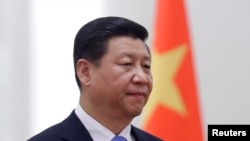China's foreign ministry has suggested a new national security committee proposed this week by Communist Party leaders will focus more on domestic threats than foreign ones.
The comments came a day after a vaguely worded communique issued at the end of a key party meeting said that Beijing would form a committee to "safeguard national security," referring to the body by the same Chinese name as it uses to refer to the U.S. National Security Council.
There has been speculation Beijing made the decision partly in response to its worsening territorial disputes with its neighbors, including its high-profile spat with Japan.
When asked Wednesday whether the proposal was influenced by Tokyo's recent decision to form its own national security council, foreign ministry spokesman Qin Gang emphasized the domestic role of the proposed body.
"Doubtless, with China's establishment of the state security committee, terrorists will be nervous, separatists will be nervous, religious extremists will be nervous. In short, those who threaten and damage China's security will be nervous," said Gang.
Some analysts agree. They say the decision was aimed at countering what Beijing considers the "three evils" of terrorism, separatism and religious extremism, specifically in its western provinces, where Muslim Uighur and Tibetans complain of government persecution.
Ken Dewoskin, the director of the China Research and Insight Center for the financial risk management consultancy Deloitte, told VOA he sees very little foreign emphasis in the the Communist Party's communique.
"If you read the details about the national security group, the point is to kind of consolidate the security apparatus that China has already. And actually, the focus of it in my mind is surprisingly domestic," said Dewoskin.
News of the national security committee's formation came just two weeks after an incident in Tiananmen Square, where authorities say a Uighur from the Xinjiang region used his car to commit a "terrorist attack" that killed himself, two other attackers and two tourists.
China has also experienced an outbreak of self-immolations by Tibetans. Since 2009, more than 120 Tibetans have set themselves on fire in incidents the government calls acts of terrorism.
However, much of the government's national security focus has also been overseas, including in the South and East China Seas, where many of China's neighbors accuse it of acting more aggressively in defending its claims to disputed areas.
In an interview published Wednesday in the official People's Daily, retired Chinese military general Luo Yuan said the formation of the committee would be in the interest of "quick and efficient decision making in national security."
Other analysts have said it could be modeled on the United States' National Security Council, which is controlled by the White House.
The comments came a day after a vaguely worded communique issued at the end of a key party meeting said that Beijing would form a committee to "safeguard national security," referring to the body by the same Chinese name as it uses to refer to the U.S. National Security Council.
There has been speculation Beijing made the decision partly in response to its worsening territorial disputes with its neighbors, including its high-profile spat with Japan.
When asked Wednesday whether the proposal was influenced by Tokyo's recent decision to form its own national security council, foreign ministry spokesman Qin Gang emphasized the domestic role of the proposed body.
"Doubtless, with China's establishment of the state security committee, terrorists will be nervous, separatists will be nervous, religious extremists will be nervous. In short, those who threaten and damage China's security will be nervous," said Gang.
Some analysts agree. They say the decision was aimed at countering what Beijing considers the "three evils" of terrorism, separatism and religious extremism, specifically in its western provinces, where Muslim Uighur and Tibetans complain of government persecution.
Ken Dewoskin, the director of the China Research and Insight Center for the financial risk management consultancy Deloitte, told VOA he sees very little foreign emphasis in the the Communist Party's communique.
"If you read the details about the national security group, the point is to kind of consolidate the security apparatus that China has already. And actually, the focus of it in my mind is surprisingly domestic," said Dewoskin.
News of the national security committee's formation came just two weeks after an incident in Tiananmen Square, where authorities say a Uighur from the Xinjiang region used his car to commit a "terrorist attack" that killed himself, two other attackers and two tourists.
China has also experienced an outbreak of self-immolations by Tibetans. Since 2009, more than 120 Tibetans have set themselves on fire in incidents the government calls acts of terrorism.
However, much of the government's national security focus has also been overseas, including in the South and East China Seas, where many of China's neighbors accuse it of acting more aggressively in defending its claims to disputed areas.
In an interview published Wednesday in the official People's Daily, retired Chinese military general Luo Yuan said the formation of the committee would be in the interest of "quick and efficient decision making in national security."
Other analysts have said it could be modeled on the United States' National Security Council, which is controlled by the White House.












